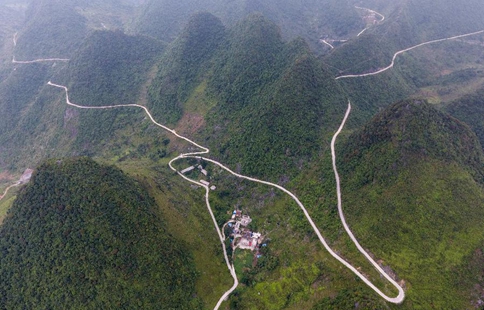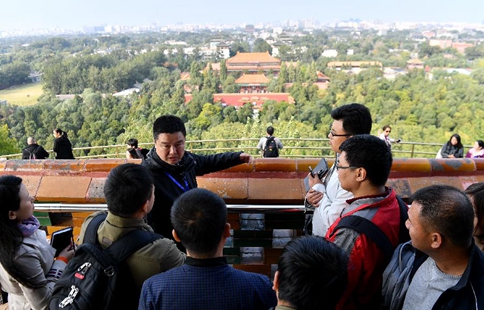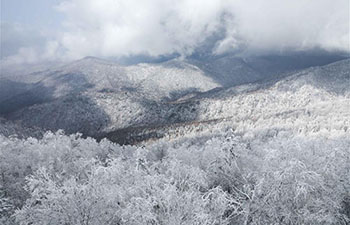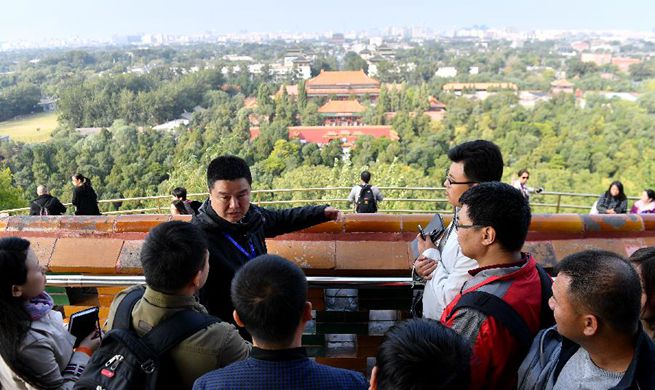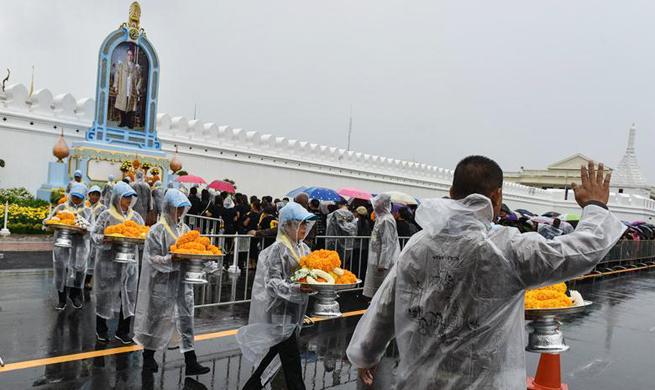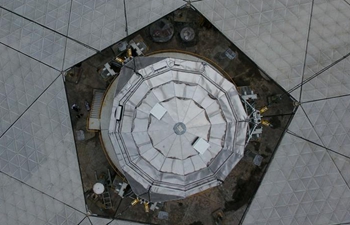By Peter Mertz, Huang Heng
DENVER, the United States, Oct. 13, (Xinhua) -- Five miles (8.5 Kilometers) northeast of downtown Denver in the hot, arid desert sun, a small cluster of buildings erected almost overnight is drawing attention crossing the Pacific.
The 2017 Solar Decathlon, held in Denver Thursday, drew 11 teams from three countries, including nine from United States, and each from the Netherlands and Switzerland. Hundreds of university students tried to build the most energy efficient structure in just 10 days.
"The Department of Energy says 30,000 students have participated" since the first event in 2002 on the National Mall in downtown Washington DC, said Denver event organizer Joe Simon.
Students are participating in "a real project with real deadlines, a real budget, and real quality performance measures," Simon told Xinhua.
Competing teams are judged on architecture, market potential, engineering, communications, innovation, water, health, appliances, home life and energy, and feature young architects and engineers on the cutting edge of building conservation technology.
Thursday, the Swiss team had a big lead on the competition, and was headed for the overall championship, after building a remarkable all-glass structure featuring photovoltaic solar array walls that flipped up to maximize sun absorption.
"Their house is the most airtight in the competition," said Paul Norton, president of Newton Energy Research and Development located in Boulder in Colorado state. Newton Energy was assigned the task of transmuting energy data into scoring points for the competition.
"We use research grade equipment that has high accuracy and reliability," Norton noted, that employ "the same measurement scales used in our work with the Department of Energy and the National Renewable Energy Laboratory in Colorado."
Cleo Wiseman, a 26-year-old civil engineer, spearheaded Switzerland's water management and hot water production for the community center that her team constructed. She told Xinhua that her team was able to reduce consumption by 50 percent for users of the facility.
"We are using composting toilets that use no water, rainwater collection system, and smart devices, such as a shower device that shows your exact usage by the second," she said, then pointed to a water exchange system at the end of a shower that helped reheat new water being used, as another energy saving device.
Ruston Vogt, 36, a Sacramento State mechanical engineering professor, helped his team construct a 140 square foot (13 square meters) micro-home that is incredibly efficient.
"We use heated water through the floors to create heat, and run the home using smart technology," Vogt told Xinhua, explaining that a grid of sensors and computer plus-ins mounted on the wall of the home could allow a user to track temperatures inside walls and regulate the home from a computer or cell phone.
Besides these eye-opening facilities, Simon said the Solar Decathlon competition involves not only competition between smart college students, but also cooperation between countries determined to step into a new green energy era.
According to the U.S. Green Building Council (USGBC), buildings account for an avenge 41 percent of the world's energy use, while the industry sector and transportation only account for 30 percent and 29 percent separately.
At the 8th U.S.-China Energy Efficiency Forum Friday, Daniel Simmons, Acting Assistant Secretary of U.S. Department of Energy, said that as the two biggest energy consuming countries, the United States and China building up a strong cooperation in this field is important for both countries to develop economy and reduce pollution.
Simon told Xinhua that next year a more larger competition was scheduled to be held in China. For this reason, this year's competition was labeled as a part of the U.S.-China Energy Efficiency Forum which hosted in Denver from Thursday to Friday.
"China offers a unique mindset that solves problems in various ways," Simon said, citing the country's "willingness to embrace creativity and flexibility" as creating many opportunities for sustainable growth.
Seated next to Simon in the judge's office during the Denver competition was Lucas Li, the Director of Competition Operations for the upcoming 2018 Solar Decathlon China. Li has been getting expert advice on staging next year's event in Dezhou, Shandong Province.
"The biggest surprise was watching the teams assemble houses in just nine days," Li told Xinhua, "The houses are pretty big, the weather has not been good, and I was very impressed to see them get it done."
China has been developing a lot of green construction and is dedicated to sustainably, but pollution is a very big issue, according to Li. "Air and water, especially in north China, is still very serious problem."
Li emphasized the need for China to improve its overall building energy efficiency with "green buildings, green energy, and green activities" and China welcomes international cooperation with United States and other partners.
China's 2018 Solar Decathlon will bring students from the most prestigious schools in the country, including Tsinghua, Tongji and Peking University. While Purdue and Western New England Universities, and the University of Illinois and the New Jersey Institute of technology will lead the 2018 American team.
Li said 22 teams will compete in the competition from 44 universities from the U.S., Canada, India, Israel, France, Germany, Turkey and Italy.
"People in the big cities are more concerned about the environment, especially in cities like Beijing and Shanghai. They want their kids to grow up in a healthy environment," Li said.






